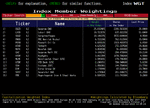timsk
Legendary member
- Messages
- 8,837
- Likes
- 3,538
What if the stock does not belongs to the index, any thoughts on that?
Guys, I am sorry if you think I am a fool just stretching on the same question but the fact is although I can figure this out myself, it might take months to study the relation between index and stocks (under and outside the index). I am just hoping that the experience of someone from amongst you could come handy. That's what forums are for, isn't it, sharing and helping:innocent:
Regards,
Vipul
Hi Vipul,
Following on from Charlton's post, here are a few generally perceived rules of thumb regarding stock trading. Are they cast in stone to be relied upon 100% of the time? No, absolutely not. Can you do the opposite and still do well? Yes Indeedy! In no particular order . . .
The movement of a stock is dictated 50% by the market index, 30% by the sector and 20% by the stocks own technical and fundamental picture.
The above completely goes out of the window if there's major news about the stock. If the Chief Financial Officer goes AWOL, is rumoured to be living on an exotic island with no extradition treaty and there's $100mill missing from the company piggy bank - guess what happens to the share price - even if the main market is more bullish than a very bullish thing! 😆
A rising tide floats all boats. All things being equal, if the main market is rising, so will the sectors and individual constituent stocks. (As already advised, best not to p1ss against the wind.)
A weak stock that struggles to rise when the market is in a short term bull rally is a prime candidate to short when the market index reverses back down. Conversely, a strong stock that fails to be dragged down by a weak market is a prime long candidate when the index starts to rise.
Lastly, regarding your question - all stocks listed on an exchange (like the LSE or NYSE) will belong to a sector and, in turn, a main market index. If they're not, I'd recommend you exercise extreme caution about trading them as the volumes are likely to be very thin and technical analysis is likely to be pretty meaningless - partly because no one will be looking at it.
HTH
Tim.

